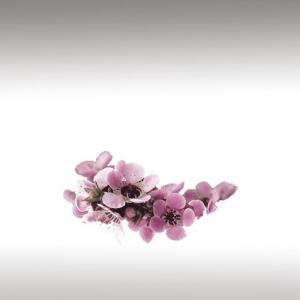
MANUKA ESSENTIAL OIL (LEPTOSPERMUM SCOPARIUM) - ESSENTIAL OILS

BASE / GENERAL DATA
Information submited: September 21, 2016 Modified: March 15, 2018 By: OperaDreamhouse
Botanical Name: Leptospermum scoparium.
Botanical Origin: New Zealand
Common Method of Extraction: Steam Distilled
Part Typically Used: Leaves and twigs.
Color: From light clear yellow to dark brown.
Consistency: Medium and slightly oily.
Perfumery Note: Top to Middle.
Shelf Life: 2 - 7 years.
Strength of Initial Aroma: Woody, earthy, balsamic. It is richer and warmer than common Tea Tree. Manuka essential oil has a woodsy, cedar like smell that is much warmer than Tea tree. Manuka oil has a honey-like aroma, sweet yet herbaceous and medicinal.
Blends Well With: Lavandin, Lavender, Clary Sage, Rosemary, Oak Moss, Pine, Cananga, Geranium, Marjoram and Spice oils, particularly Clove and Nutmeg.
Common name: Manuka myrtle, New Zealand Teatree, Broom Tea-Tree, Tea Tree, Mānuka.
Chemical structure:
Leptospermone
(E)-Calamenene
a-Pinene
Cadina-3,5-diene
Delta-Cadinene
a-Copaene
Favesone
Cadina-1,4-diene
B-Selinene
a-Selinene
Isoleptospermone:
Note: This species is often confused with the closely related species Kānuka - the easiest way to tell the difference between the two species in the field is to feel their foliage - Mānuka leaves are prickly, while kānuka leaves are soft. The wood is tough and hard.
Leptospermum Scoparium is a species of flowering plant in the myrtle family Myrtaceae, native to New Zealand, New South Wales, Victoria, Tasmania, and the Chatham Islands.
It is a prolific scrub-type tree and is often one of the first species to regenerate on cleared land. It is typically a shrub growing to 2 - 5 m tall, but can grow into a moderately sized tree, up to 15 m or so in height. It is evergreen, with dense branching and small leaves 7 - 20 mm long and 2 - 6 mm broad, with a short spine tip. The flowers are white, occasionally pink, 8 - 15 mm in diameter, with five petals.
Evidence suggests that Leptospermum Scoparium originated in Australia before the onset of the Miocene aridity, and dispersed relatively recently from eastern Australia to New Zealand. It has been postulated that on arrival in New Zealand, Leptospermum scoparium became established in limited edaphically suitable areas until the arrival of the Polynesian people. It is now found throughout New Zealand, but is particularly common on the drier east coasts of the North and South Islands, and in Australia in Tasmania, Victoria and New South Wales.
Mānuka (from Māori) is the common name used along with "Jelly Bush" and "Tea Tree" in Australia and to a lesser extent also in New Zealand. This name arose because Captain Cook used the leaves to make a "tea" drink.
Aromatherapy specialists gives priority to Manuka oil from New Zealand. Manuka essential oil is about 100 different compounds. Compared with other representatives of the family (Myrtle essential), Manuka essential oil is quite unique. Ethereal oil is very important trichetones (Triketone) - leptospermone and favesone. It is particularly important that manuka is grown birthplace - New Zealand. In Australia growing Manuka essential oil has many times less trichetones (Triketone).
Monoterpenes, which gives the Manuka ethereal oil particularly good antibacterial properties, appears only in the fourth year of life of the plant, vital triketones accumulate only in certain geographical areas for growing plants. Manuka essential oil from The East Cape region of New Zealand has been confirmed as having the highest antimicrobial activity. There is evidence indicating that it is up to 20 times more potent than Australian Tea Tree oil (Melaleuca Alternifolia).
Mānuka sawdust imparts a delicious flavour when used for smoking meats and fish. It is cultivated in New Zealand for Mānuka honey, produced when honeybees gather the nectar from its flowers, and for the pharmaceutical industry.
Botanical Origin: New Zealand
Common Method of Extraction: Steam Distilled
Part Typically Used: Leaves and twigs.
Color: From light clear yellow to dark brown.
Consistency: Medium and slightly oily.
Perfumery Note: Top to Middle.
Shelf Life: 2 - 7 years.
Strength of Initial Aroma: Woody, earthy, balsamic. It is richer and warmer than common Tea Tree. Manuka essential oil has a woodsy, cedar like smell that is much warmer than Tea tree. Manuka oil has a honey-like aroma, sweet yet herbaceous and medicinal.
Blends Well With: Lavandin, Lavender, Clary Sage, Rosemary, Oak Moss, Pine, Cananga, Geranium, Marjoram and Spice oils, particularly Clove and Nutmeg.
Common name: Manuka myrtle, New Zealand Teatree, Broom Tea-Tree, Tea Tree, Mānuka.
Chemical structure:
Leptospermone
(E)-Calamenene
a-Pinene
Cadina-3,5-diene
Delta-Cadinene
a-Copaene
Favesone
Cadina-1,4-diene
B-Selinene
a-Selinene
Isoleptospermone:
Note: This species is often confused with the closely related species Kānuka - the easiest way to tell the difference between the two species in the field is to feel their foliage - Mānuka leaves are prickly, while kānuka leaves are soft. The wood is tough and hard.
Leptospermum Scoparium is a species of flowering plant in the myrtle family Myrtaceae, native to New Zealand, New South Wales, Victoria, Tasmania, and the Chatham Islands.
It is a prolific scrub-type tree and is often one of the first species to regenerate on cleared land. It is typically a shrub growing to 2 - 5 m tall, but can grow into a moderately sized tree, up to 15 m or so in height. It is evergreen, with dense branching and small leaves 7 - 20 mm long and 2 - 6 mm broad, with a short spine tip. The flowers are white, occasionally pink, 8 - 15 mm in diameter, with five petals.
Evidence suggests that Leptospermum Scoparium originated in Australia before the onset of the Miocene aridity, and dispersed relatively recently from eastern Australia to New Zealand. It has been postulated that on arrival in New Zealand, Leptospermum scoparium became established in limited edaphically suitable areas until the arrival of the Polynesian people. It is now found throughout New Zealand, but is particularly common on the drier east coasts of the North and South Islands, and in Australia in Tasmania, Victoria and New South Wales.
Mānuka (from Māori) is the common name used along with "Jelly Bush" and "Tea Tree" in Australia and to a lesser extent also in New Zealand. This name arose because Captain Cook used the leaves to make a "tea" drink.
Aromatherapy specialists gives priority to Manuka oil from New Zealand. Manuka essential oil is about 100 different compounds. Compared with other representatives of the family (Myrtle essential), Manuka essential oil is quite unique. Ethereal oil is very important trichetones (Triketone) - leptospermone and favesone. It is particularly important that manuka is grown birthplace - New Zealand. In Australia growing Manuka essential oil has many times less trichetones (Triketone).
Monoterpenes, which gives the Manuka ethereal oil particularly good antibacterial properties, appears only in the fourth year of life of the plant, vital triketones accumulate only in certain geographical areas for growing plants. Manuka essential oil from The East Cape region of New Zealand has been confirmed as having the highest antimicrobial activity. There is evidence indicating that it is up to 20 times more potent than Australian Tea Tree oil (Melaleuca Alternifolia).
Mānuka sawdust imparts a delicious flavour when used for smoking meats and fish. It is cultivated in New Zealand for Mānuka honey, produced when honeybees gather the nectar from its flowers, and for the pharmaceutical industry.

SPIRITUAL PRACTISES DATA
Information submited: September 21, 2016 Modified: March 15, 2018 By: OperaDreamhouse
Manuka essential oil is considered beneficial for those who have a highly sensitive nervous system. It can help for those prone to stress and anxiety and is used to sooth old psychic wounds. This essential oilcan help protects and balance the nervous system. Chakras associated with this essential oil are 2nd,3rd, 4th and 6th.

MEDICINE / HEALTH DATA
Information submited: September 21, 2016 Modified: March 15, 2018 By: OperaDreamhouse
Therapeutic Properties:
Antibacterial
Anti-fungal
Anti-inflammatory
Antiseptic
Antimicrobial
Antihistamine
Cicatrisant
Cytophylactic
Relaxant.
Antibacterial
Anti-fungal
Anti-inflammatory
Antiseptic
Antimicrobial
Antihistamine
Cicatrisant
Cytophylactic
Relaxant.
Contraindications: Keep away from eyes and mucous membranes. It is non-toxic, non-irritant and non-sensitizing.
Pregnancy / Lactation : Avoid use during pregnancy because of spasmolytic activity. If you are pregnant, nursing, taking medication consult a health professional prior to use.
Children: Suitable for all ages, from infants to the elderly.
Guidelines: There are no reported clinical studies of Manuka oil on which dosage recommendations can be based. Apply 2 - 4 drops directly to desired area. Dilution not required, except for the most sensitive skin. Use as needed. For external use only.
Manuka is one of the youngest entries in the book of aromatherapy, as its uses in aromatherapy were discovered quite recently. However, its medicinal uses have been known for a long time among the original inhabitants of New Zealand, the country to which this tree is native.
For centuries, New Zealand Maori have used the Manuka oil from the native Tea Tree, Manuka, to treat everything from rheumatism and fevers to burns and skin disorders.
Used in skin care, the antibacterial, anti-fungal and anti-inflammatory properties of remarkable Manuka oil combat skin irritation and infections, including acne-causing bacteria. Manuka oil is up to 33 times stronger than tea tree essential oil for protecting against certain strains of bacteria. It's also effective against the Methicillin-Resistant Staph. Aureus (MRSA) bacteria, which is resistant to normalantibiotics. Manuka essential oil has selective antibacterial activity against gram positive organisms, such as Staphylococcus aureus and Micrococcus luteus.
Thetriketone chemotype is grown in the New Zealand. This Manuka oil is unique and important because of the higher level of antimicrobial activity. Specifically the antiviral content of the the Triketone Manuka is special because of its relatively high levels of flavesone and leptospermone.
The Manuka tree has been exploited by indigenous New Zealanders for centuries for its ability to treat aching joints and muscular pain. The anti-inflammatory properties of Manuka essential oil are well understood and it can help relieve a range of muscular aches and pains as well as inflammatory conditions such as rheumatism.
As well as its physical benefits, Manuka essential oil is developing a growing reputation in aromatherapy for its ability to combat a range of complaints related to the mind like stress and anxiety. According to many experts, Manuka essentialoil has remarkable calming and soothing effects on the heart and mind.
A. Leading German Aromatherapist- Ruth von Braunschweig reports on the sensual, "Feel good" side of Manuka oil, stating it to be beneficial for people with over sensitive nervous systemsand those who suffer from stress and anxiety. Conditions that often manifest themselves in allergic reactions. She states that "Manuka Oil" is very effective for many skin problems. It strengthens the psyche and at the same time stabilizes the skin, it makes it more resistant, because it is relaxing for the skin nerves as well as cell activating and regenerating for the outer skin layers. The skin doesn't overreact constantly, - it doesn't come out in a rash so fast. Therefore Manuka is helpful for sensitive skin, especially itching, acne, badly healing skin, inclination to fungal infections, ulcers, bedsores and infections.
Manuka essential oil has cicatrisant properties meaning that it is an effective way to heal damaged skin and scarring. It is useful in treating acne due to antibacterial and skin healing properties. The oil can promote the growth and regeneration of new cells while protecting any wounds from developing infection. Manuka oil has also been found useful in fighting impetigo.
Leptospermum Scoparium promotes new cell growth and thereby promotes overall growth and the healing of wounds. It can be given to patients that have suffered heavy wounds after an accident or surgery.
For anybody that suffers from allergic reaction to dust, pollen or pet hair, then Manuka essential oil can be used to calm down and soothe those hyper reactions.
Inhaling Manuka essential oil can help treat a variety of respiratory conditions including sinus congestion, asthma and the symptoms of colds and the flu.
Histamine aggravates coughs and gives bad and exhausting coughs. People often try very strange combinations of medicines to control histamine. However, this oil quickly and easily reduces the production of histamine and thereby gives relief from these continuous coughs in a safe way.
This is also good for hypertensive people whose blood pressure shoots up at the slightest anxiety or tension, thereby helping to protect the heart.
Pregnancy / Lactation : Avoid use during pregnancy because of spasmolytic activity. If you are pregnant, nursing, taking medication consult a health professional prior to use.
Children: Suitable for all ages, from infants to the elderly.
Guidelines: There are no reported clinical studies of Manuka oil on which dosage recommendations can be based. Apply 2 - 4 drops directly to desired area. Dilution not required, except for the most sensitive skin. Use as needed. For external use only.
Manuka is one of the youngest entries in the book of aromatherapy, as its uses in aromatherapy were discovered quite recently. However, its medicinal uses have been known for a long time among the original inhabitants of New Zealand, the country to which this tree is native.
For centuries, New Zealand Maori have used the Manuka oil from the native Tea Tree, Manuka, to treat everything from rheumatism and fevers to burns and skin disorders.
Used in skin care, the antibacterial, anti-fungal and anti-inflammatory properties of remarkable Manuka oil combat skin irritation and infections, including acne-causing bacteria. Manuka oil is up to 33 times stronger than tea tree essential oil for protecting against certain strains of bacteria. It's also effective against the Methicillin-Resistant Staph. Aureus (MRSA) bacteria, which is resistant to normalantibiotics. Manuka essential oil has selective antibacterial activity against gram positive organisms, such as Staphylococcus aureus and Micrococcus luteus.
Thetriketone chemotype is grown in the New Zealand. This Manuka oil is unique and important because of the higher level of antimicrobial activity. Specifically the antiviral content of the the Triketone Manuka is special because of its relatively high levels of flavesone and leptospermone.
The Manuka tree has been exploited by indigenous New Zealanders for centuries for its ability to treat aching joints and muscular pain. The anti-inflammatory properties of Manuka essential oil are well understood and it can help relieve a range of muscular aches and pains as well as inflammatory conditions such as rheumatism.
As well as its physical benefits, Manuka essential oil is developing a growing reputation in aromatherapy for its ability to combat a range of complaints related to the mind like stress and anxiety. According to many experts, Manuka essentialoil has remarkable calming and soothing effects on the heart and mind.
A. Leading German Aromatherapist- Ruth von Braunschweig reports on the sensual, "Feel good" side of Manuka oil, stating it to be beneficial for people with over sensitive nervous systemsand those who suffer from stress and anxiety. Conditions that often manifest themselves in allergic reactions. She states that "Manuka Oil" is very effective for many skin problems. It strengthens the psyche and at the same time stabilizes the skin, it makes it more resistant, because it is relaxing for the skin nerves as well as cell activating and regenerating for the outer skin layers. The skin doesn't overreact constantly, - it doesn't come out in a rash so fast. Therefore Manuka is helpful for sensitive skin, especially itching, acne, badly healing skin, inclination to fungal infections, ulcers, bedsores and infections.
Manuka essential oil has cicatrisant properties meaning that it is an effective way to heal damaged skin and scarring. It is useful in treating acne due to antibacterial and skin healing properties. The oil can promote the growth and regeneration of new cells while protecting any wounds from developing infection. Manuka oil has also been found useful in fighting impetigo.
Leptospermum Scoparium promotes new cell growth and thereby promotes overall growth and the healing of wounds. It can be given to patients that have suffered heavy wounds after an accident or surgery.
For anybody that suffers from allergic reaction to dust, pollen or pet hair, then Manuka essential oil can be used to calm down and soothe those hyper reactions.
Inhaling Manuka essential oil can help treat a variety of respiratory conditions including sinus congestion, asthma and the symptoms of colds and the flu.
Histamine aggravates coughs and gives bad and exhausting coughs. People often try very strange combinations of medicines to control histamine. However, this oil quickly and easily reduces the production of histamine and thereby gives relief from these continuous coughs in a safe way.
This is also good for hypertensive people whose blood pressure shoots up at the slightest anxiety or tension, thereby helping to protect the heart.

BEAUTY / COSMETICS DATA
Information submited: September 21, 2016 Modified: March 15, 2018 By: OperaDreamhouse
Dandruff is an annoying scalp complaint that is very difficult to get rid of permanently even when you spend large amounts of your hard earned cash on commercial anti-dandruff products.
Fortunately, there are a number of natural remedies and Manuka essential oil is one of the more effective. Dandruff is typically caused by insufficient moisture or oil on the scalp and Manuka essential oil is a great way to deal with these causes. It can help balance the level of oil on the scalp and also fight any scalp infections.
This oil has varied effects on the skin. It can be used to cure itches, rashes, skin diseases, sores, chafing and other problems related with the skin, as well as to cure pain in the muscles and joints.
Manuka essential oil supports the appearance of healthy-looking skin, reduces the appearance of blemishes, and can be added to your favorite skin care products.
Manuka essential oil works as a very effective deodorant for your body and feet.
Fortunately, there are a number of natural remedies and Manuka essential oil is one of the more effective. Dandruff is typically caused by insufficient moisture or oil on the scalp and Manuka essential oil is a great way to deal with these causes. It can help balance the level of oil on the scalp and also fight any scalp infections.
This oil has varied effects on the skin. It can be used to cure itches, rashes, skin diseases, sores, chafing and other problems related with the skin, as well as to cure pain in the muscles and joints.
Manuka essential oil supports the appearance of healthy-looking skin, reduces the appearance of blemishes, and can be added to your favorite skin care products.
Manuka essential oil works as a very effective deodorant for your body and feet.

FOOD / COOKING DATA
COMMENTS
No comments.


